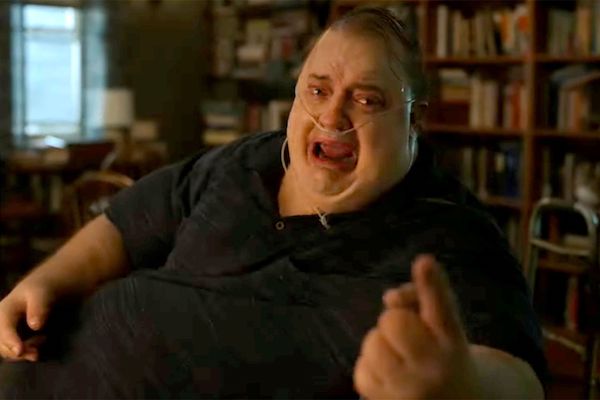Film Review: “The Whale” – Rough Sailing
By Ed Symkus
Darren Aronofksy’s new film might not be everyone’s cup of ambergris.
The Whale is playing at Boston Common 19, The Coolidge Corner Theatre, and the Somerville Theatre.

Brendan Fraser as Charlie in The Whale.
When Samuel D. Hunter’s play The Whale was first staged just over a decade ago, audiences were treated to — or perhaps appalled by — a story of very troubled people trying to help other very troubled people. It was about relationships that festered among folks who were suffering from all sorts of addictions — some physical, some emotional.
The lead character, Charlie, is a grossly misshapen fellow who has taken the act of overeating to a grotesque extreme. He weighs somewhere near the 600-pound mark. He offers two excuses: “I lost someone who was close to me” and “I let it get out of control.” Then there’s Charlie’s estranged 17-year-old daughter Ellie who, when asked to write down any thoughts that come to her, grabs a pen and pad, and scribbles, “I hate everyone.”
A note on these two: Ellie is not only an angst-ridden teenager who comes from a broken home. Yes, dad walked out on drunken mom years earlier after he fell in love with another man. It turns out that she has no compassion for anyone. Charlie is a nice man who has maintained a lifelong positive attitude even though it’s mostly his own actions and inaction that have led to his deadening predicament.
There’s also Charlie’s longtime pal and nurse Liz, who does her best to look out for him and try to convince him to seek medical help, regarding his weight and other issues. But she is also his enabler, bringing along buckets of fried chicken when she visits his apartment. And there’s Thomas, a young, would-be missionary who happens to knock on Charlie’s door, hoping he might be the next person whose life he saves. Naturally, plenty of inner turmoil is churned up between them.
And, since roiling psyches are at the center of films directed by Darren Aronofsky (Mother!, Black Swan, The Wrestler, Requiem for a Dream among them), he was an ideal choice to call the shots on this one, working from a script adapted by dramatist Hunter.
Obviously, The Whale‘s psychodrama is dank and dark. The smell of mortality is omnipresent: I lost track of how many times somebody mentions that Charlie is dying, seemingly of his own volition. He refuses to go to the hospital, insisting he doesn’t have any insurance. Ellie is mean to all and sundry because she’s convinced that life’s given her a raw deal. Liz is into controlling other people’s lives because she’s lost control of her own. Thomas is a weak-willed loser who has no concept of what he wants or which way to turn.
But, thankfully, the narrative is more than an onslaught of grimness. Aware that despair becomes monotonous, Hunter has deftly placed sparks of hope and humor throughout the script. Aronofsky has given his actors the freedom to use their skills to shift the mood in humane directions. Some of the humor is meant to be startling; it could come across as off-putting, but it almost always provides some welcome relief from the aura of entropy.
Brendan Fraser’s Charlie is a character I’ve not met before. He’s a bright man, a very good college writing teacher (who goes through his online classes with his camera turned off, so students can’t see his condition), and an eternal optimist. As an actor, he’s a captive of his fat suit, but we get to know him via his sweet smile and sad, puppy dog eyes. A match in terms of adroit characterization — though with much less screen time — is Hong Chau as Liz, a woman who has never come to grips with the cruelties she’s experienced, but is devoted to Charlie (for reasons that won’t be revealed here).
Ty Simpkins (the younger brother in Jurassic World) effectively manages to cover Thomas’s wide behavioral arc. But Sadie Sink (Max in Stranger Things) overdoes the strident nastiness of Ellie; both she and Aronofsky miss the mark in their attempt to instill some sympathy into this stick figure.
Why is the film called The Whale? One reason — a derogatory one — would be that it’s about a terribly obese man whose size is magnified because he never leaves his cramped apartment. But there are also numerous allusions in the script to Moby-Dick. The question arises: If Ahab had managed to kill the white whale, would the maniac’s life have brightened up? A similar interrogative hovers in the background of this film: Would Charlie’s life have been better if he had found a way to connect with and earn the love of his daughter? No answers are given, but Fraser’s riveting performance makes the question surprisingly compelling.
Ed Symkus is a Boston native and Emerson College graduate. Among his accomplishments: He went to Woodstock, interviewed Edward Gorey, Ray Bradbury, and Ted Nugent, and has visited the Outer Hebrides, the Lofoten Islands, Anglesey, Mykonos, the Azores, Catalina, Kangaroo Island, and the Isle of Capri with his wife Lisa.
